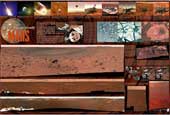
 |
|
|
|
With so many books covering Galileo’s astronomical feats, Dan Hofstadter’s unique book bridges a gap in our scientific and moral understanding of both man and the times. The prologue immediately sets the scene with the day Galileo was summoned to appear before the Roman Inquisition. The charge, simply to account for his published debates on an Earth-centred system of the Universe versus the Sun-centred system. Galileo’s book entitled Dialogue Concerning the Two Chief World Systems had been published in May 1632 and confusion reigned as to exactly Galileo’s basis of acknowledging the Papal and Roman Catholic doctrine. Galileo wrote purely from an astronomical viewpoint and although may have miscalculated the impact of his work, appears innocent of the charge of heresy. I am particularly impressed with Hofstadter’s in-depth linking of Galileo’s astronomical observations from his early use of the newly invented telescope in 1609/1610 through to the time of publication of his book and how this jarred against the backdrop of the Roman authorities’ dismissal of the Copernican heliocentric theory of the Universe. For the first time, we are brought face-to-face with notable individuals involved in the case, including Cioli, Niccolini, and Ciampioli, who attempted to offer evidence in support of Galileo. I do not wish to comment on the actual case as the book allows the reader to arrive at their own conclusion – such is the mastery of Hofstadter; but be advised the anecdotal remarks that enliven the text, help this process immeasurably. Hofstadter’s superb book attempts to, without prejudice, redress the balance and bring Galileo’s character forward. In this, the book is a superlative effort. Ian Welland |
|
|
|
2009 Yearbook This 132-page special edition features the ultimate observing guide for 2009, a review of all the biggest news stories of 2008, in depth articles covering all aspects of astronomy and space missions for 2009, previews of International Year of Astronomy events and much, much more. This 132-page special edition features the ultimate observing guide for 2009, a review of all the biggest news stories of 2008, in depth articles covering all aspects of astronomy and space missions for 2009, previews of International Year of Astronomy events and much, much more.Infinity Rising  This special publication features the photography of British astro-imager Nik Szymanek and covers a range of photographic methods from basic to advanced. Beautiful pictures of the night sky can be obtained with a simple camera and tripod before tackling more difficult projects, such as guided astrophotography through the telescope and CCD imaging. This special publication features the photography of British astro-imager Nik Szymanek and covers a range of photographic methods from basic to advanced. Beautiful pictures of the night sky can be obtained with a simple camera and tripod before tackling more difficult projects, such as guided astrophotography through the telescope and CCD imaging.Exploring Mars  Astronomy Now is pleased to announce the publication of Exploring Mars. The very best images of Mars taken by orbiting spacecraft and NASA's Spirit and Opportunity rovers fill up the 98 glossy pages of this special edition! Astronomy Now is pleased to announce the publication of Exploring Mars. The very best images of Mars taken by orbiting spacecraft and NASA's Spirit and Opportunity rovers fill up the 98 glossy pages of this special edition!Mars rover poster  This new poster features some of the best pictures from NASA's amazing Mars Exploration Rovers Spirit and Opportunity. This new poster features some of the best pictures from NASA's amazing Mars Exploration Rovers Spirit and Opportunity. |
||||||||||||||||||||||||